
Best Antivirus for Mac 2022: Mac Security Software Compared
Macs may be a far less tempting target for malware and viruses, but they’re not immune from attack. Even if you don’t care about adware or being used as means to infect users on other platforms, it’s still possible to fall victim to ransomware, password theft, or stolen iPhone backups.
Accordingly, good antivirus software will protect your Mac on all of these fronts. It’ll catch malware that’s still spreading or in circulation; block ransomware; protect older systems with out-of-date software from security vulnerabilities; prevent your Mac from acting as a carrier for malware aimed at other operating systems; and keep infected files off of any virtual machines you’re running.
As to the question of which antivirus software you should choose for your Mac, our current top pick is Intego Mac Internet Security. However, you will find several other recommendations below that may suit you better, depending upon the type and number of devices that need protection and also how much you want to pay.
Our top contenders dominate by posting perfect (or virtually near perfect) scores from security research labs, passing our own malware detection tests with flying colors, offering well-designed interfaces, and even throwing in extra features like a firewall or password manager.
For some great discounts and deals see our
best Mac antivirus deals round up.
Do Macs need antivirus?
Plenty of Mac aficionados will tell you that Apple computers are inherently secure and don’t require protection. We’d argue that they are wrong – or overconfident, at the very least.
Not long ago, the
Silver Sparrow malware was detected on Macs powered by the latest M1 processor and infected hundreds of thousands of Macs in total. The bad guys, then, are still very much targeting Mac users and they’re getting smarter and greedier. As a result, cyber security is something you can’t afford to ignore, and good antivirus is a very good place to start if you want to stay safe.
Macs are generally more secure than their Windows brethren for two reasons. On the technical side, macOS is a Unix-based operating system. As a Unix-based operating system macOS is sandboxed.
Sandboxing is like having a series of fire doors: even if malware gains access to your Mac, it is unable to spread to other areas of the machine. They are more difficult to exploit than Windows PCs, but Macs are not unhackable.
More general advice can be found in our
Mac security tips; and those who have been hit by a malware attack should try
how to remove a virus from a Mac.
Best antivirus for Mac reviews
1. Intego Mac Internet Security X9
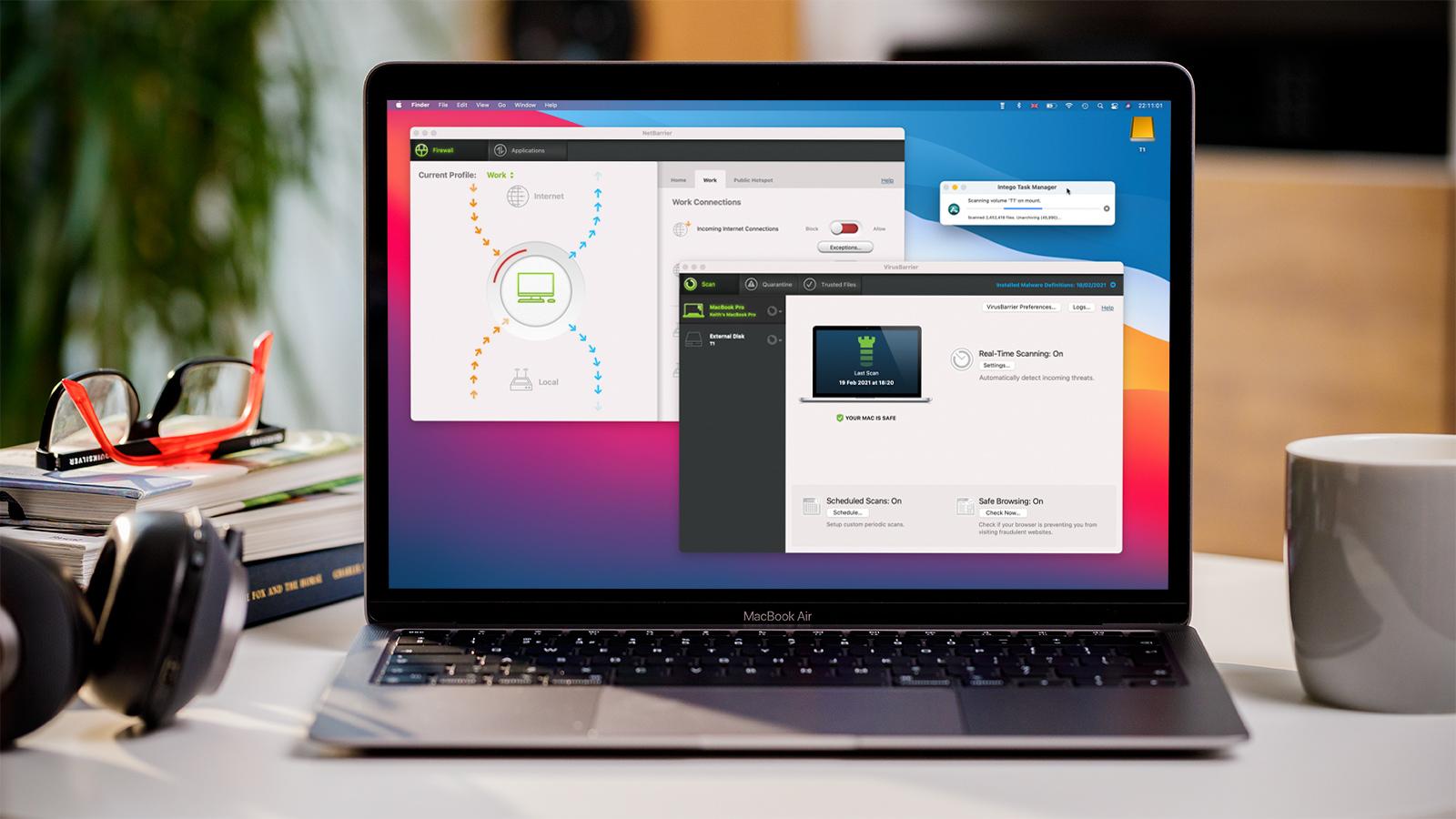
Pros
- Two-way firewall
- Good performance
Cons
- Mac-specific (no Windows / Android protection)
MSRP:
$24.99 per year, 1 Mac
Intego’s Mac Internet Security X9 suite is a pair of utilities designed to help you keep your Mac safe and running smoothly. These are VirusBarrier and NetBarrier, which catch and kill malware threats plus spot potential intrusion attempts from outside as well as outgoing attempts from rogue software.
You can get Intego Mac Internet Security X9 here.
The Mac Premium Bundle X9 adds three more sets of capabilities to these: the backup prowess of Personal Backup (a good ‘belt’ addition to your Time Machine ‘braces’), the useful cleaning, tidying and general speed optimising tricks of Mac Washing Machine, and finally the multi-user safe surfing intelligence of ContentBarrier.
Sure, that last one is not something everyone needs, but it’s great for parents. Whichever one of these software suites you choose, you can be sure they offer some of the best protection available for your Mac.
Read our full
Intego Mac Internet Security X9 review
2. McAfee Total Protection
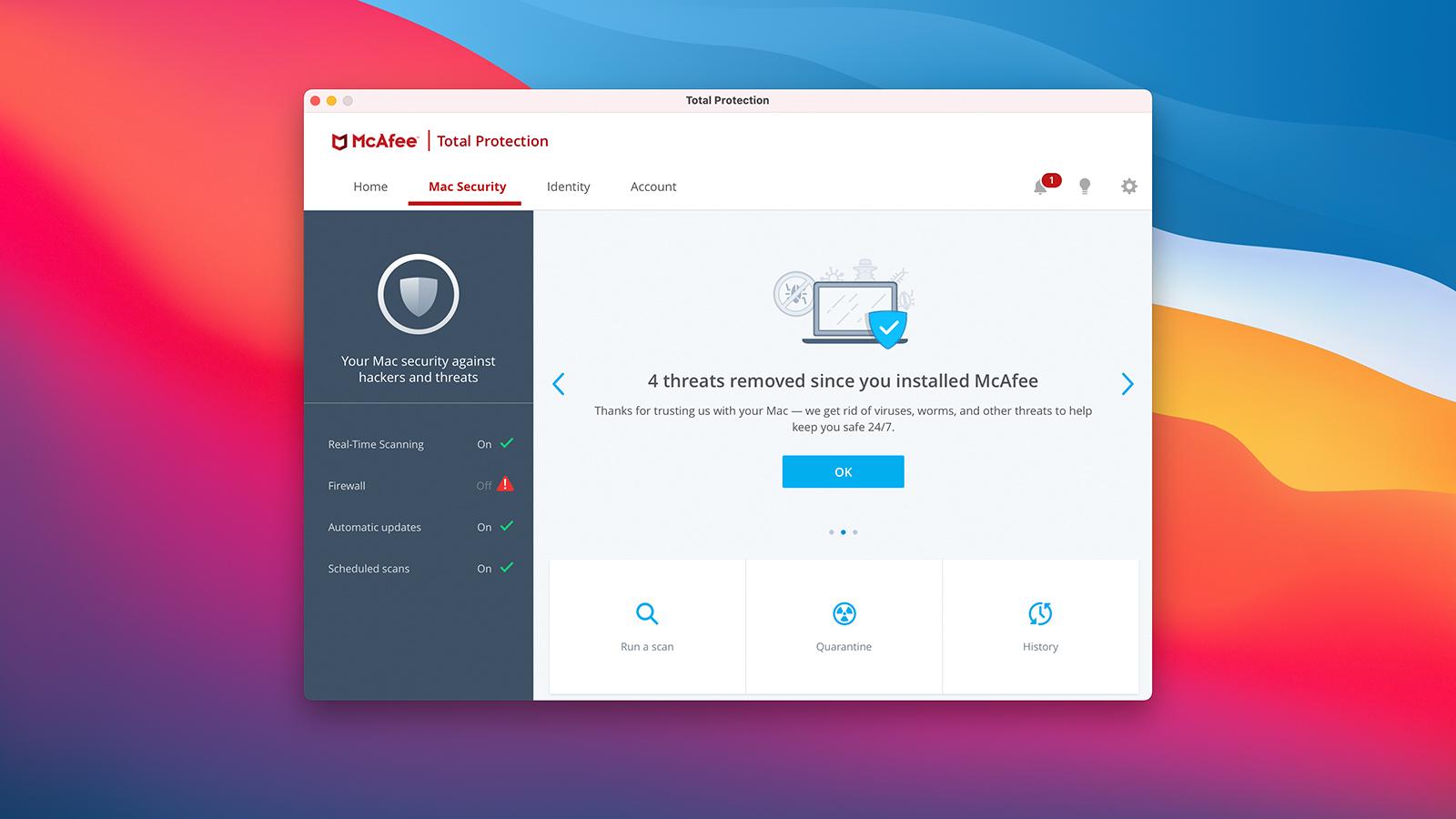
Pros
- Affordable cover for multiple devices
- Simple automated operation
Cons
- Lack of detail in activity reports
- Occasional performance impacts
MSRP:
US$39.99 per year (2 years, 5 devices), $119.99 subsequent years
Total Protection from McAfee is a dedicated software security tool that will monitor your Mac as you work, looking for unauthorised software activity such as browser search engine hacks, attempts to trick you into installing unwanted software, and actual malware and virus attacks.
It is very simple to use; once you’ve walked through the guided steps for giving it permission to work behind the scenes it is essentially something you can just leave to get on with its job.
Total Protection also offers WebAdvisor as an option, steering you from known problem sites and warning you when you visit questionable ones. It also offers a software firewall for two-way network traffic monitoring.
We noted some occasional performance impacts as it ran in the background, but it was largely unobtrusive in its efforts. The option of protecting other devices is useful as well, covering smartphones and Windows PCs as you require.
It’s worth noting that the Windows version in particular offers more features, such as a native VPN, which you don’t get in the Mac app.
Read our full
McAfee Total Protection review
3. Norton 360 Deluxe
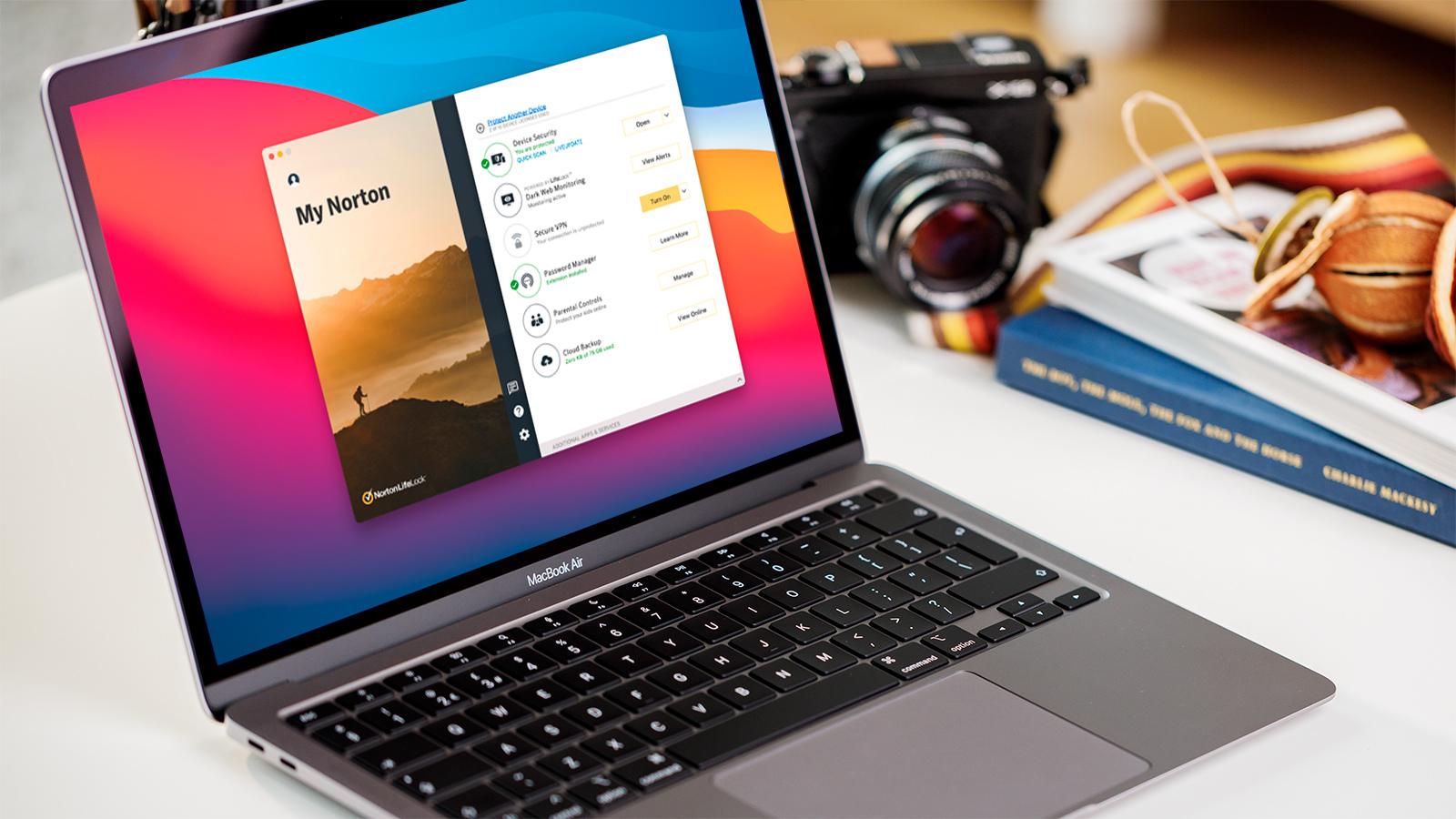
Pros
- Easy-to-use & effective
- Multiple device cover
- Minimal performance impact
Cons
- No backup on macOS
- Didn’t spot threats in zip files
MSRP:
$49.99 (1 year, 5 devices), $104.99 subsequent years
Norton 360 Deluxe is a security utility that performs a range of different monitoring and safeguarding operations to keep your Mac free from threats such as browser hacks and search engine hijack scripts to intrusion attempts and actual malware.
It focuses on catching unwanted software, but it also offers some useful additional features including a VPN for securing personal data while online, and a tool for managing passwords, bank card details and similar data.
There are three different versions, two of which can also be used to secure your iPhone as well as Android smartphones and Windows PCs, should you require that. In tests it proved to have little to no detectable impact on performance, and it spotted all the challenges in our test macOS setup.
Note that the Cloud Backup feature doesn’t work on macOS, but that is more of an extra rather than a vital part of the package.
Read our full
Norton 360 Deluxe review
4. Avast Premium Security
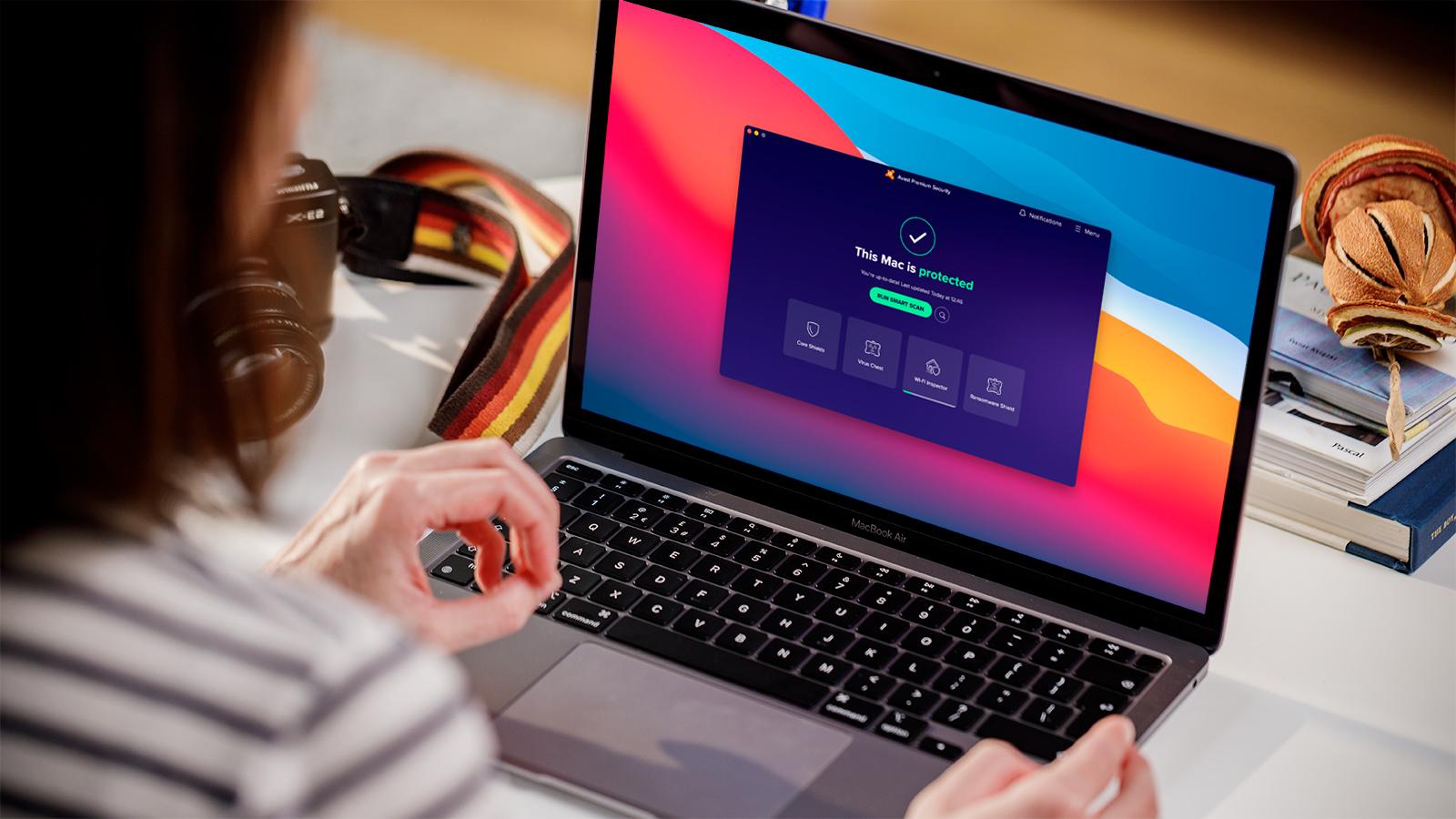
Pros
- Doesn’t generally impact performance
- Caught all problem test files
Cons
- Slow manual scanning
- No option for single-device license
- Upselling
MSRP:
$44.99 (1 year, 10 devices), $89.99 subsequent years
Avast Premium Security for Mac does its job well overall. There are a few niggles such as the unwanted upselling for Cleanup Premium and the fact that the File Shield monitoring slows down file copy times a bit.
Otherwise, it’s a well-featured suite which will protect from all sorts of nasties including watching for browser script hacks, potential ransomware and other remote attack activity. It will, of course, also scan for potentially unwanted programs and actual malware threats, whether on your Mac or your removable media or in email attachments.
Custom scheduled scans can be set up, although the automatic background monitoring teamed with occasional specific manual scans is likely to be enough for most requirements. Wi-Fi network monitoring for vulnerabilities is another feature this software offers, and the Real Site option watches for fake sites pretending to be legitimate shopping or banking sites, a serious risk that goes beyond just watching for unwanted files on your own Mac. It is very effective at all these things, although we found that customising its behaviour can be a little fiddly.
Read our full
Avast Premium Security review
5. Bitdefender Total Security 2021
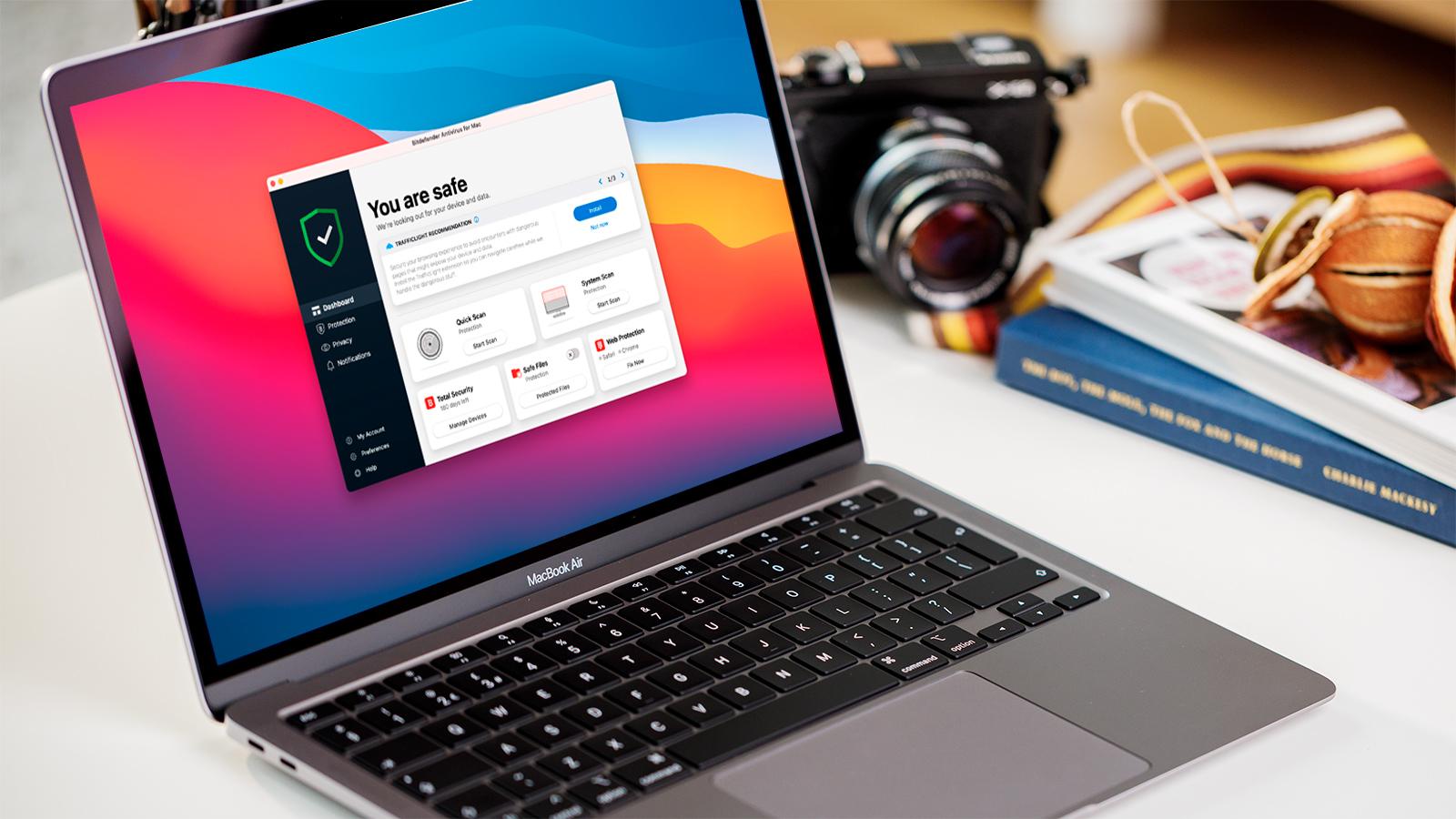
Pros
- Doesn’t slow down your Mac
- Effective real-time protection
- Unobtrusive browsing protection
Cons
- No password manager
- Very limited VPN
- No identity protection
MSRP:
$39.98 (1 year, 5 devices), $89.999 subsequent years
Bitdefender Total Security is a very effective tool for keeping your Mac safe, and it will also protect Windows PC, an iOS and Android devices. The bundled VPN is very basic and gives you only 200MB of data per day, but the rest of the suite of tools is effective and easy to manage.
But when you compare what the Mac version offers compared to the Windows version, you’ll feel quite hard done by. There’s no password manager, no social network protection, no webcam or microphone protection, no Wi-Fi security advisor and plenty of other features that Windows users get for the same price.
Bitdefender is also lagging behind its rivals with no identity protection. If your goal is simply to keep your Mac protected from malware, then Bitdefender does a great job. But you can find better value elsewhere.
Read our full
Bitdefender Total Security 2021 review
6. Eset Cyber Security Pro

Pros
- Effective protection
- Full control over settings
Cons
- Minor impact on Mac performance
- No VPN
- No iOS version
MSRP:
$49.95 (1 year, 1 device)
Eset Cyber Security Pro is a useful security tool that protects your Mac – and your Windows PC, Linux box and even Android phones, although not your iPhone – against unauthorised software behaviour, network intrusions, search engine hijack scripts and worse.
It stands out from its competition through its comprehensive range of preferences controls that can fine-tune many aspects of its behaviour, and its relatively low price.
It isn’t the most unobtrusive in terms of background performance impact, although most of the time this was minor enough to be not really noticeable.
As well as real-time and on-demand monitoring it also provides a useful firewall, dedicated tools for spotting web-based threats including spyware, and protection against phishing attempts to trick users into divulging private data. It also offers parental controls with three user categories and detailed control over what kinds of sites each user is allowed to visit.
Read our full
Eset Cyber Security Pro review
7. Trend Micro Antivirus for Mac
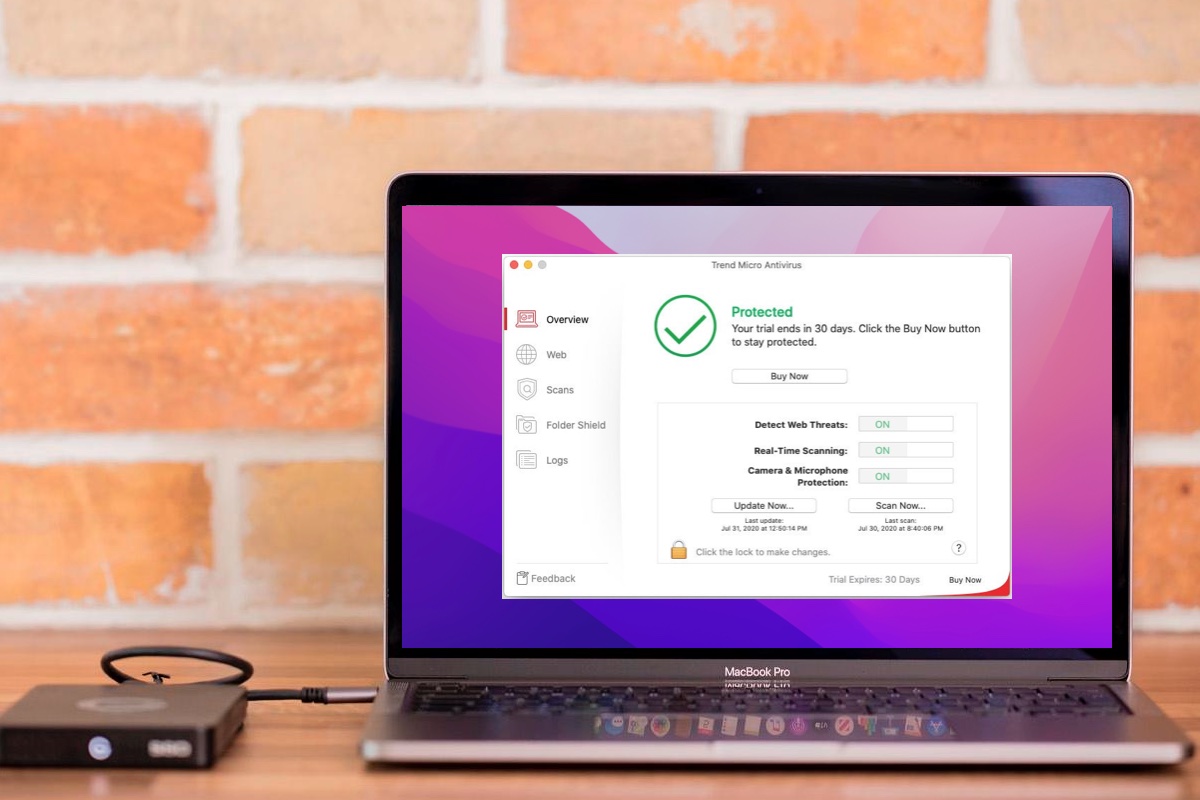
Pros
- High malware detection rate
- Monitors for ransomware-style attacks from unknown software in specific folders
Cons
- Wouldn’t detect some malware in real-time in our tests
- Fewer extra features compared to less-expensive or similarly priced higher-rank competitors
Trend Micro Antivirus is a good program with well rated antivirus protection, and a simple, straightforward interface that users will appreciate.
Anyone looking for additional features will be disappointed with this suite, but it offers good protection at a fair price.
In March 2022 AV-Test gave Trend Micro Antivirus for Mac a 99 percent protection score against 200 samples.
Our own spot checks produced similarly good results. Lining up against the Objective See malware library Trend Micro had no trouble detecting most threats. However in a few cases it didn’t detect all the malware contained in a folder until a scan had been run.
Trend Micro is an excellent choice for those looking for something that’s simple and easy to use. There are options with better protection, but Trend Micro’s protection is still good and pricing is fair.
Read our full
Trend Micro Antivirus for Mac review
8. Avira Prime
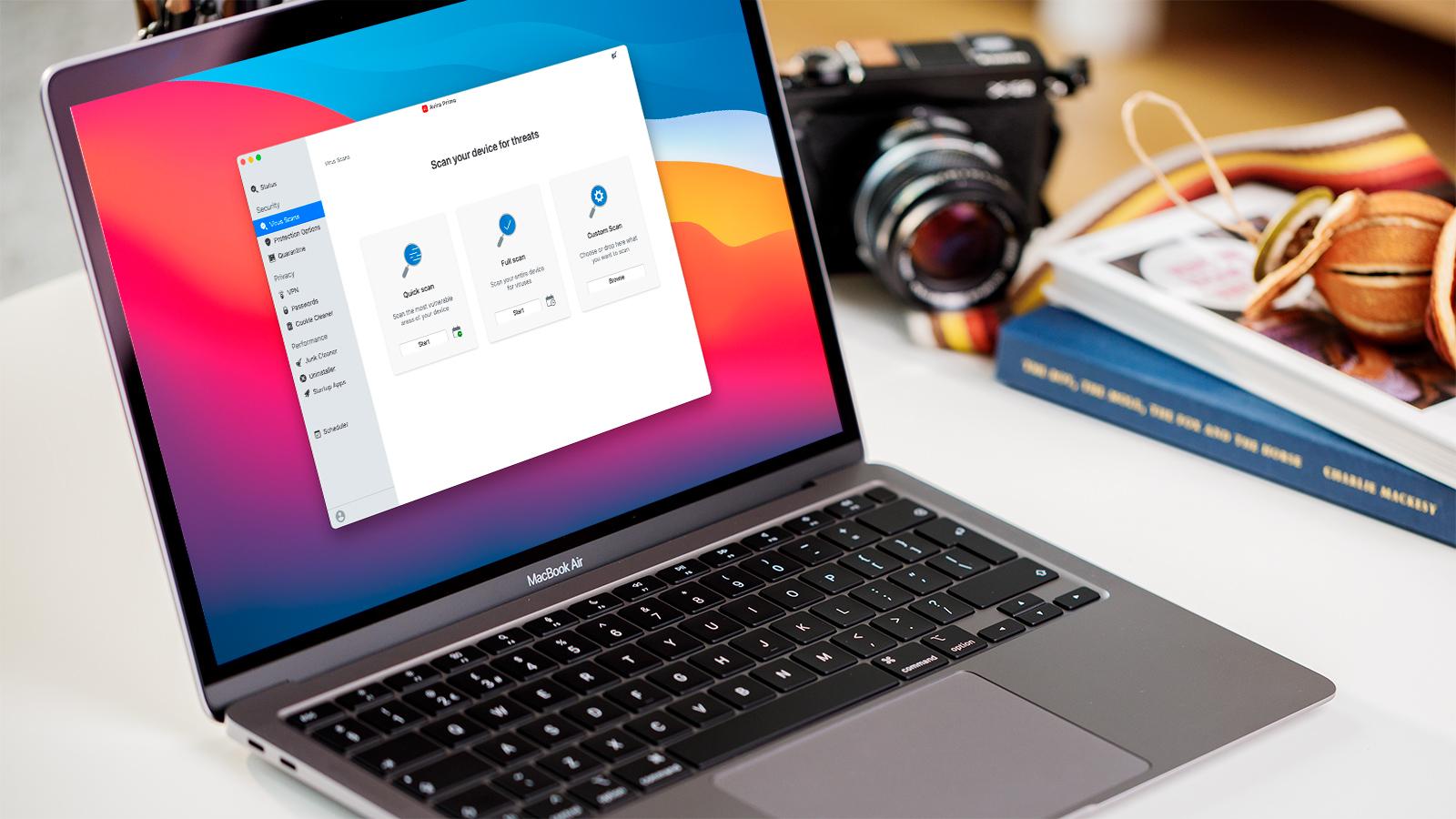
Pros
- Easy to use
- Full VPN
- Won’t slow down your Mac
Cons
- No fine-tuning scan options
Avira Prime is a security utility designed to keep your Mac safe from potentially unwanted programs; which covers everything from simple scripts designed to compromise and redirect your browser searches through to actual malware.
A single large window presents the various features, from scans to app management and cleanup, although a couple of its features use a separate panel for a web-based console. In our tests it detected all our compromised files and installers.
It doesn’t look inside zip archives or disk images, but it pounces as soon as items are extracted from these.
Most importantly, even while Avira Prime is actively scanning for trouble it has such a small impact on the general performance of our Mac that we wouldn’t notice it without comparing timings. You can get the basics of the security features with Avira Free Security but Prime’s annual subscription provides useful additional capabilities, if you can stomach the high cost.
Read our full
Avira Prime review
9. Airo Antivirus for Mac
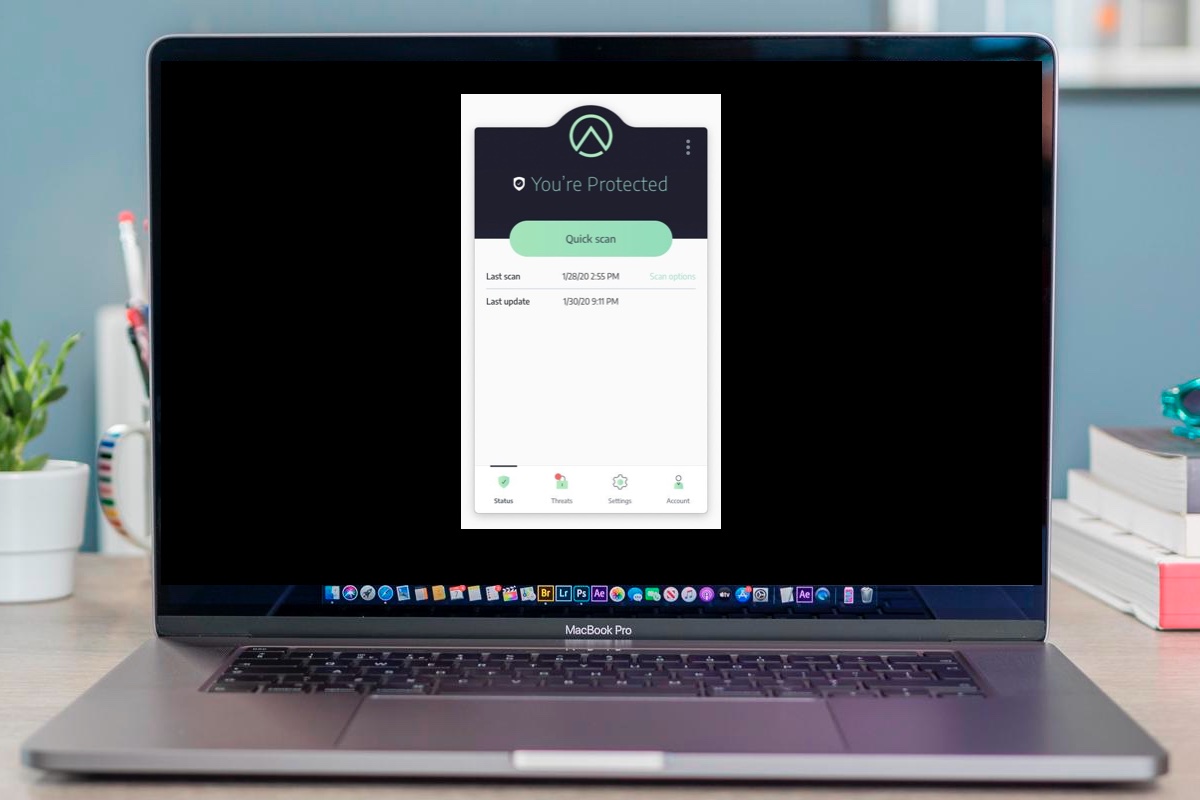
Pros
- Early tests show very good malware detection
- Good pricing
Cons
- Phishing protection not yet available
- Current app doesn’t support scan scheduling
MSRP:
$119.99 per year, 5 Macs
Airo is built from the ground up for Mac. The interface is very easy to navigate, and tests indicate its detection capabilities are very good.
AV-Test gave Airo a 100 percent rating based on its detection of widespread and prevalent malware test, which had 145 samples.
Since Airo is focused on the Mac its native engine doesn’t detect Windows malware, instead Airo uses the Bitdefender scanning engine to prevent Windows malware. In our tests, Airo had no trouble identifying and quarantining the samples we tried.
There are options for scanning files in real time, blocking adware, scareware, and suspicious files, and cloud protection.
Airo is good, easy to understand, and the scan button is readily available, but perhaps the biggest benefit is that the team behind it is focused on the Mac.
Read our full
Airo Antivirus for Mac review
10. Kaspersky Total Security for Mac 2022

Pros
- Top-rated antivirus engine
- Reasonably priced
- Host of effective tools under one roof
Cons
- No dedicated Mac version
- Awkward installation process for the Mac
- Certain tools require separate apps to manage them
MSRP:
$99.99 for five devices, one year (Deal price: $49.99)
The 2022 version of Kaspersky Total Security offers a raft of features, including antivirus and anti-phishing protection, ad blocking and private browsing, webcam spying protection, a VPN, a child locator with parental controls, screen time management, and a password manager.
The main disappointment with Kaspersky Total Security 2022 is the installation process on the Mac – made all the more frustrating by the fact that installing on Windows is quick and easy.
Mac users have to download and install the Internet Security product and then download and install the password manager and Safe Kids tools as separate apps. Kaspersky doesn’t make this clear.
Once installed, the product is robust and effective. Based on 2021 testing for anti-virus products, Kaspersky received top marks for protection, performance, and usability from
AV-Test and solid grades from
AV Comparatives. The product also was rated the best antivirus software for 2022 from
Security.org.
Total Security offers access four key features: scanning, updating, privacy, and Safe Kids. To hunt down malware, you can run a full scan, a quick scan, or a scheduled scan. The Safe Money feature protects your credentials when you shop or bank online, while the Kaspersky password manager sets up strong passwords.
There is also an easy to configure VPN and the Safe Kids app (which can be accessed via a smartphone app) brings parental controls.
Read our full
Kaspersky Total Security for Mac 2022 review
11. Sophos Home Premium for Mac
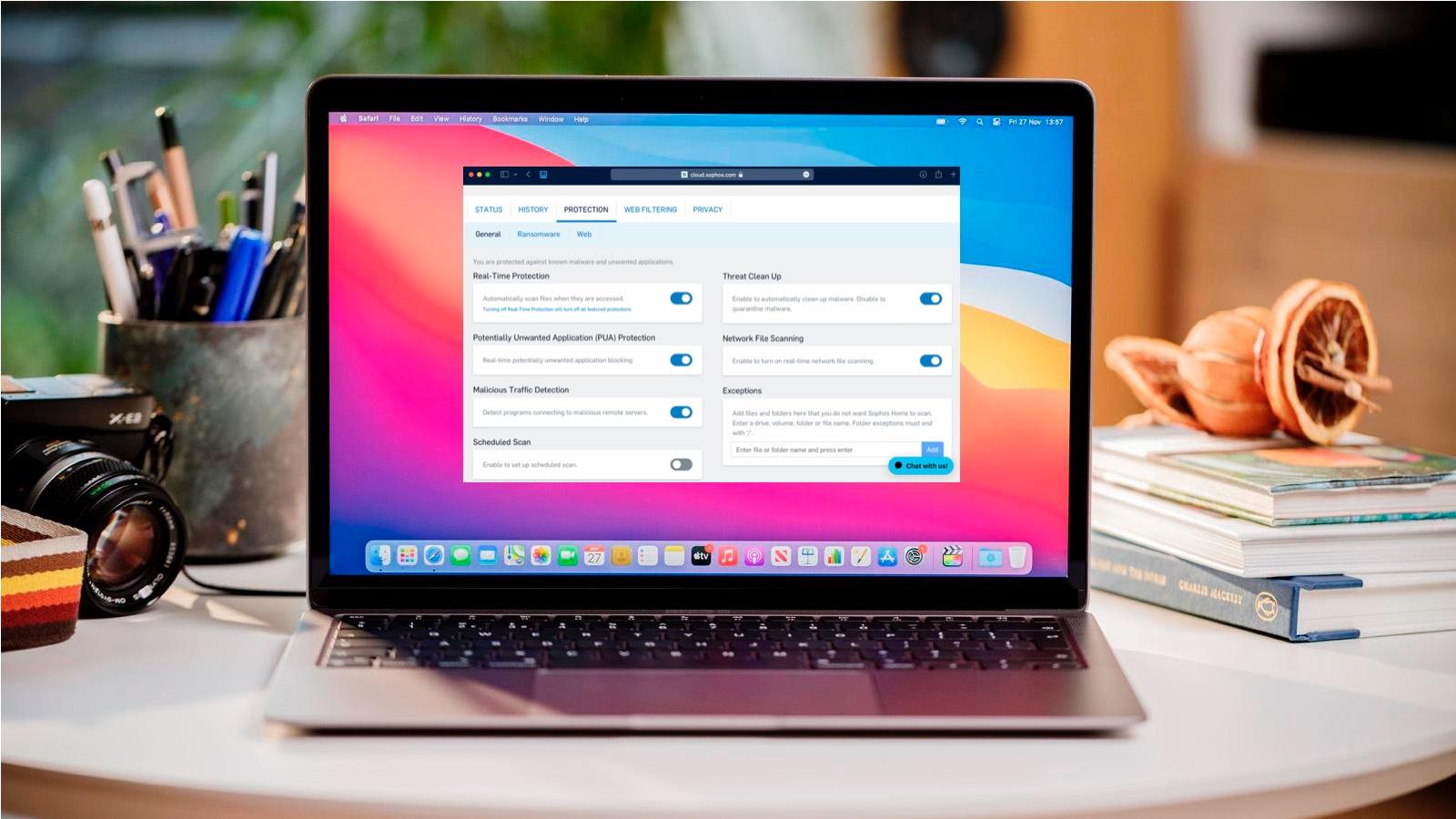
Pros
- Effective protection
- Reasonably priced
Cons
- Confusing setup process
- Configuring software and running scheduled scan is cloud-based
MSRP:
$59.99 for one year, up to 10 devices
Sophos used to offer a free version of its Home product with antivirus protection and website protection, but in 2021 that version was discontinued, leaving Sophos Home Premium as the only option for personal use.
There’s now a 30 days full trial, but after that it costs £37.46/$44.99 for the first year and £49.95/$59.99 for each subsequent year. You can install on 10 Macs or PCs though.
Setup was confusing. Initially the software guides you through the process, but then setup stops and you have to sign into your
Sophos Home dashboard to complete setup (it’s not at clear that you need to do this step).
There’s also no Dock icon to launch the program, instead you use a menu bar icon to access the online dashboard where you can control the five types of protection including:
- Antivirus protection – real-time scanning for local and network drives, perform a manual scan or schedule one, plus a quick scan can be triggered from the menu bar icon.
- Web protection
- Ransomware protection
- Privacy protection
- Malicious traffic detection
- Web filtering
A
2017 evaluation of macOS security software by AV-Test gave Sophos Home outstanding grades for protection, performance, and usability. We ran the EICAR test, which simulates a virus, and Sophos detected and blocked it with no trouble. The website filtering worked well.
Sophos Home Premium provides effective protection, but the setup process and cloud-only features are drawbacks. It needs clearer set up and the ability to do more locally.
Read our full
Sophos Home Premium for Mac review
12. Malwarebytes Premium for Macs
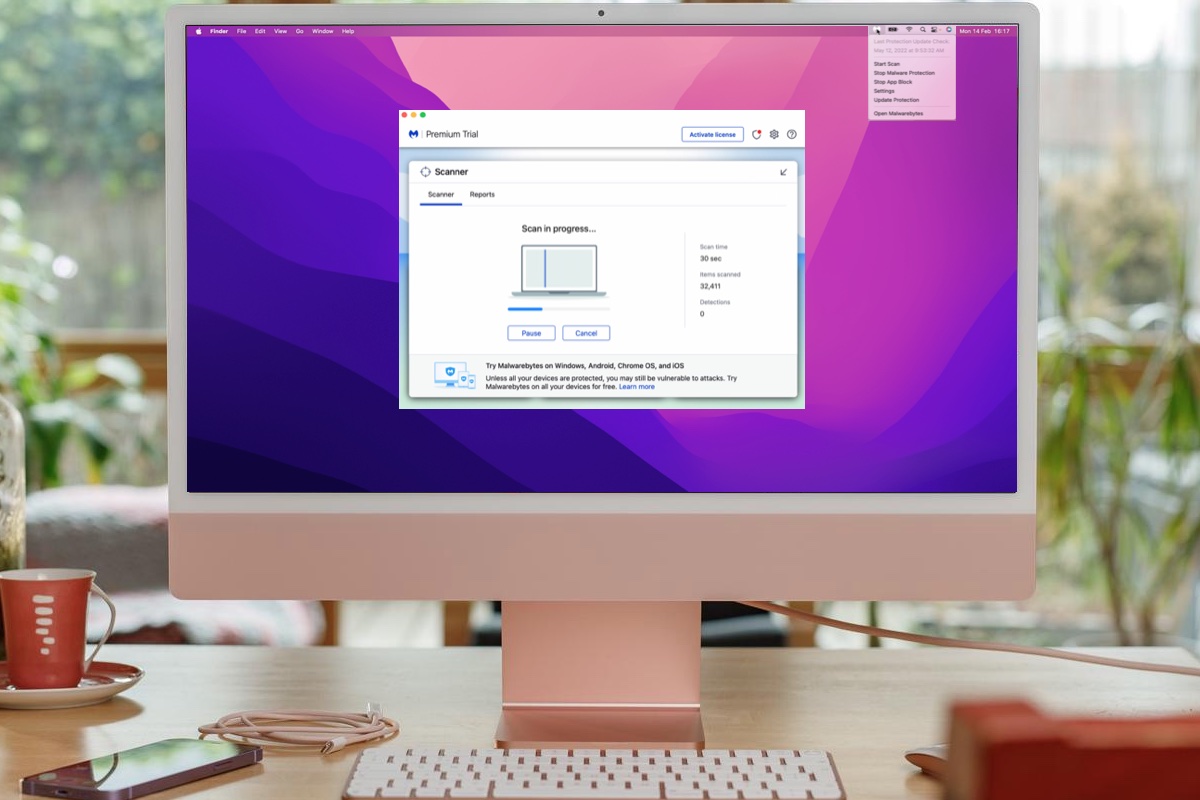
Pros
- Offers all the basic types of security
- Easy to use
- Reasonably priced
Cons
- Mac version missing certain features compared with its Windows counterpart
- Excludes any mention or advice on the Malwarebytes browser extension
Malwarebytes comes in both free and premium editions for personal use. Unfortunately the Mac version falls short of many of the features of the Windows version. Malwarebytes Premium for Mac includes the basis virus and malware scanning as well as the ability to detect malicious apps, or PUPs (potentially unwanted program). The real-time protection constantly monitors your system for security threats, automatically blocking and quarantining anything that could infect your computer.
But it doesn’t directly come with the protection against malicious links and phishing attempts. Nor does it offer the safeguards against ransomware and zero-day exploits.
There is a free version of Malwarebytes, but that just includes just basic virus scanning. The premium version costs $3.33/£2.50 billed monthly or $39.99/£29.99 billed annually for one device, and $6.67/£5.83 billed monthly or $79.99/£69.99 billed annually for five devices. There’s a free 14-day trial.
Malwarebytes Premium on a Mac is accessible through a menu bar icon. Clicking the icon displays a menu with options to start a scan, temporarily turn off the malware protection and malicious app blocker, update the program, view and tweak its settings, and open the management console.
From the management console you can trigger a manual scan and set up scheduled scans to run on a recurring basis. A detection history displays all quarantined items. There’s an Allow list to add legitimate files or programs that were mistakenly flagged as malware to.
Malwarebytes Premium has regularly and consistently gotten top marks from AV-Test for protection, performance, and usability. In real-world testing conducted by AV Comparatives during February and March of 2022, the software scored 100{f5ac61d6de3ce41dbc84aacfdb352f5c66627c6ee4a1c88b0642321258bd5462} at blocking malware, though it had a high number of false positives.
It’s just a shame that the Mac version feels like an also-ran compared with the Windows edition.
Read our full
Malwarebytes Premium for Macs review
13. MacKeeper 5

Pros
- Easy management of protection
- Useful range of features
Cons
- Some performance impacts
- No throttle controls
MacKeeper 5 is the reborn version of a security utility that has been around for many years. The reputation of previous versions seems just old news now – today, it’s a useful and comprehensive tool for keeping your Mac secure and optimised as you work, play and use the internet.
The range of tools it offers in addition to watching for unwelcome software is wide ranging. There’s a memory optimiser, an update tracker to spot outdated applications, a smart uninstaller to clean up after other software and a VPN feature for secure browsing.
There’s even identify protection, which monitors password databases to catch possible ID theft efforts. While we noted occasional performance impacts from its real-time antivirus monitoring, it wasn’t something that happened all the time.
Ultimately, we liked MacKeeper’s easy and helpful interface, which makes what could be a daunting task quite approachable.
Read our full
MacKeeper 5 review
14. F-Secure Total
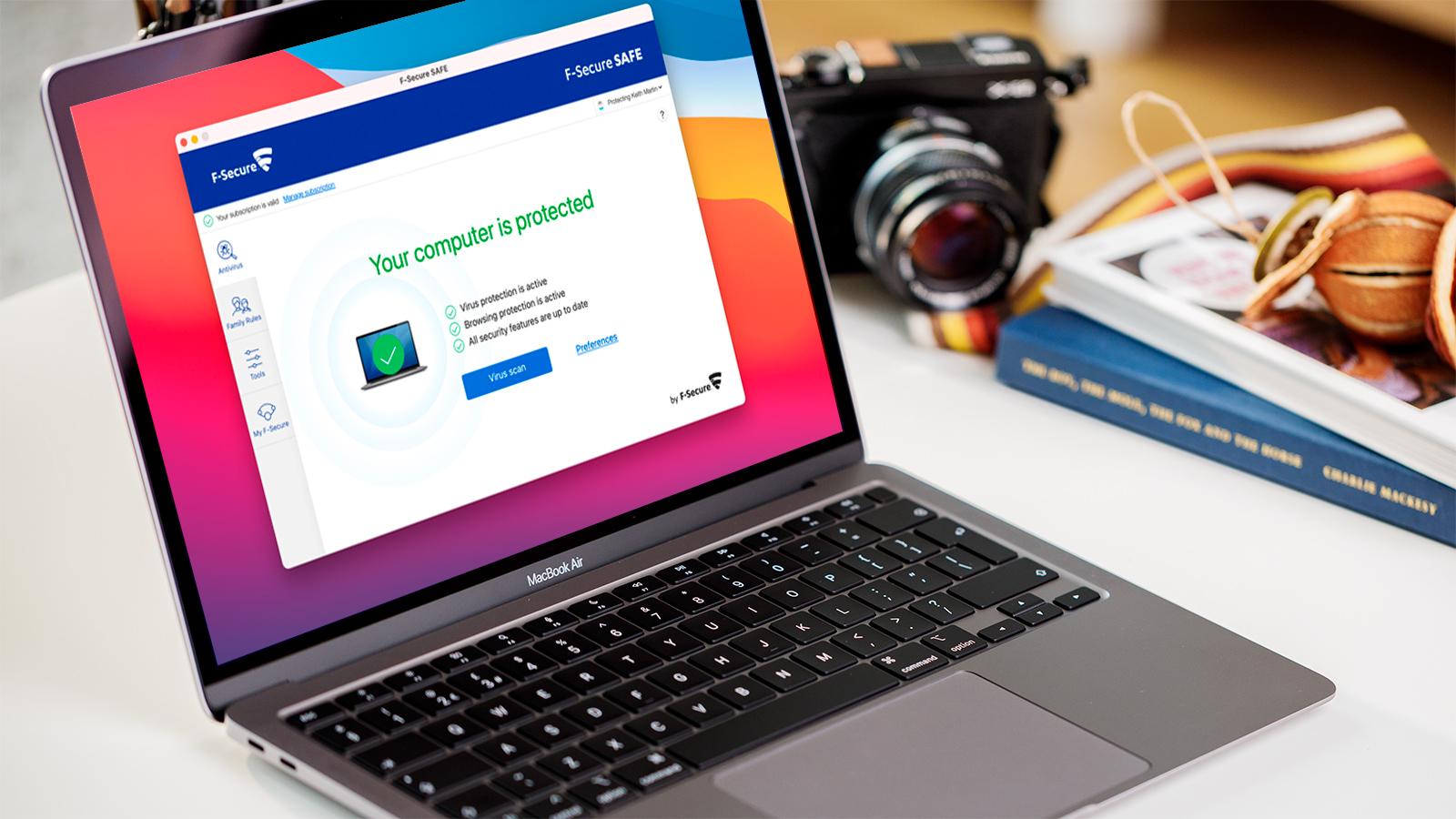
Pros
- Catches unwanted software efficiently
Cons
- Minimal controls over scanning
- Password Manager not integrated with Safari
- Limited VPN
MSRP:
$109.99 (1 year, 5 devices)
F-Secure Total is a simple-to-use security software suite that works on macOS, iOS, Windows and Android devices and protects your data from a wide range of threats. These range from the fairly common simple browser hacks and search engine hijack attempts through to the more rare but also more risky actual malware and ransomware attacks.
It performs these jobs well, although the real-time scanning behaviour – important in this kind of tool – did have some impact on the overall performance of our test Mac.
The price is high, though, its passwords management feature doesn’t directly support Safari and we noticed some interface quirks as we used it. If you want a solid and capable security utility this does fit the bill, but at the same time it’s not as convincing an option as some of its competitors.
Read our full
F-Secure Total review
How to choose Mac antivirus
Features fundamental to all packages are two ways to find viruses: on-demand protection and via always-on protection. The former finds viruses by examining one file after another during scheduled scans, or when you choose to undertake a scan, perhaps because you’re worried your Mac might be infected. The speed at which the antivirus app can do this is important, because some take a long time and also hog the Mac’s CPU while they do so. Waiting six hours to find out if your Mac is infected is neither convenient nor relaxing.
Always-on malware protection is what protects the user outside of the times when scans are run. If some malware arrives, perhaps via an email or a downloaded file, then the always-on protection should be able to detect it and either quarantine it (copy it to a safe folder so the user can decide what to do with it), or simply delete it. Usually a notification is shown when malware is detected in this way, but not all antimalware apps show the same amount of explanation of what’s happened – and this was one of the factors we examined in our testing.
Outside of direct malware detection, many security suites include additional tools such as ransomware protection. Ransomware is a type of malware that, once it’s infected a computer, encrypts all the user’s files and then demands a fee to decrypt them. To protect against this infection, anti-ransomware features typically block any app from writing to a user’s home folders, such as Documents or Photos, unless the app’s preapproved (a process called whitelisting). Lots of apps come already preapproved, of course, such as Microsoft Word, or Apple’s own Photos app. But you can add others.
Several products also include virtual private network (
VPN) add-ons. These protect an internet connection by encrypting it, and this is useful when utilising unsafe open WiFi such as that provided by a café or hotel. In our experience, these are not replacements for separate paid-for VPN services as many do not unblock video streaming services and some are cut-down versions which constantly nag you to pay extra for the full, premium versions.
Web protection via browser plugins or extensions is also a common component and aims to stop you (or your children) doing anything you regret online, such as visiting fake or infected websites or handing over personal information.
There are usually different options from each vendor, and you get more extras with the top packages, and far fewer with free ones. They might include password managers, parental controls, cloud storage – the list goes on. Generally, the underlying antimalware engine is the same in all products from the same company, so you can save money if you don’t need those additional features.
Do bear in mind that all antivirus apps are sold as yearly subscriptions. That’s right, you can’t just pay once and use forever. Often there’s a hefty discount for that first year’s subscription, but this can burn you when automatic renewal occurs a year later and the full retail price is charged: often 100{f5ac61d6de3ce41dbc84aacfdb352f5c66627c6ee4a1c88b0642321258bd5462} more. Alternatively, you can purchase several years’ subscriptions at once for a bigger discount.
Many subscriptions allow you to install the software on more than one computer (including Windows and Android devices), which can sometimes add significantly to the value – all computers, phones and tablets within a household can be protected with one subscription.
How we test
Each software package is evaluated creating a clean installation of macOS, cloning it for each AV product, and then booting separately into each one to install a different package. This was to ensure that previous app installations didn’t interfere with new ones – sometimes AV software treats other AV software as an infection.
In addition to visiting malicious websites, downloading known malicious software, and even running said malware, we also reference the most recent reports from two labs that regularly cover macOS malware: AV Comparatives and AV-TEST. These laboratories test AV software against sets of known malware as well as products that are grouped as potentially unwanted applications (like adware).
The latter doesn’t damage or expose your computer or its files but may consume power and CPU cycles. Because the testing effectively looks at a combination of virus databases and behavior, they remain good gauges even after many months. When an antivirus software package lacks a rating from a known security research lab, we do more extensive testing with real malware.
Finally, while we gave props for a lot of different features and behaviors, we marked products down if they lacked any or all of the following:
- A nearly perfect score on macOS malware detection
- Ransomware monitoring
- Native browser plug-in or system-level Web proxy
- A high score on Windows malware detection
Privacy concerns
Using an antivirus product, especially any that includes tools to also improve your online privacy, may lull you into believing you’re safe from personal and private information leaking out. That’s not quite the case. While there’s no reason to panic, you should consider a few reasonable issues.
First, an antivirus product may upload the complete text of files flagged to the cloud, where it can be analyzed by separate tools hosted there. This practice is normal and sensible: Some malware can detect when a running process may examine it, and will then engage in subterfuge. Antivirus software makers also can access their massive databases to examine files with characteristics that trigger their algorithms—certain elements that match known malware. As a result, security researchers discover new viruses, worms, Trojans horses, and the like.
However, helping the greater good means you’ll have to be comfortable with trusting a third-party with your file contents. Where appropriate, we noted privacy policy issues in individual reviews.
Second, this software may also rely partly or entirely on cloud-based checks of URLs, malware, and the like. Accordingly, an AV package might upload every URL you visit, metadata about files, signatures of files, information about your computer’s hardware, a list of running or installed applications, and more. Companies vary on their disclosure of such policies, and may not let you opt out of this kind of sharing. We note issues in each review as available.
Third, anti-virus software makers also get a sense of what behavior is happening on your computer that’s being monitored or blocked, and may use that information for their own purposes. In some cases, you can opt out of this information gathering.
